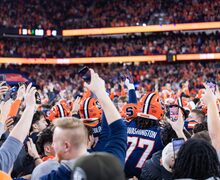SU student teaches finance and investing to Syracuse youth
Emily Steinberger | Photo Editor
Charlie Naples, an SU senior, runs an eight-week finance class over Zoom with 11 students from the North Side Learning Center and Bronx Preparatory Charter School in New York City.
The Daily Orange is a nonprofit newsroom that receives no funding from Syracuse University. Consider donating today to support our mission.
Syracuse University senior Charlie Naples began his lesson for First Generation Investors by asking the high school students on Zoom what the stock market is.
“Bill Gates,” one of the students responded immediately.
Although it wasn’t the technical answer, Naples loved it. There was no hesitation in the student’s response, no fear that they were going to be wrong.
The Zoom call was one of the eight lessons that Naples will run as a part of the Syracuse chapter of First Generation Investors, a nonprofit that teaches kids about investing by giving them real money to invest. Naples and the chapter’s four other tutors work with six students from the North Side Learning Center in Syracuse and five students from the Bronx Preparatory Charter School in New York City.
The chapter is working to break both the gender and race barriers that exist in the finance industry. The current class is made up of Black and Muslim students, and nine of the 11 students are girls.
“There’s ways to take action to decrease inequalities in our society, and this is what I consider to be an actionable task that can make a difference that goes beyond just saying that there’s issues,” Naples said. “It’s putting words into action.”
Naples learned about First Generation Investors in March, when a high school friend who helped start the original chapter at the University of Pennsylvania posted about the organization on LinkedIn. He remembers thinking that the nonprofit was the type of organization that should exist in Syracuse.
He saw that the organization also had chapters at Fordham and Harvard universities and recognized that SU “fits that profile” of a privileged school in an underprivileged area.
“One of my missions, before I leave my four years at Syracuse, is that I’ve made an impact in my classes, I’ve made an impact on my peers, but I have yet to make an impact on my local community,” Naples said.
Naples got the go-ahead from First Generation Investors to start a chapter in Syracuse in March. He then began calling high schools in the Syracuse City School District and SU’s Martin J. Whitman School of Management to implement the program, but they turned him down because of the pandemic.
It wasn’t until he saw an article about how the North Side Learning Center was looking for volunteers that he found another route for a potential partnership. He told the community center that he was looking for six high school students to participate in the program, and after four months of phone calls that went nowhere, the program came together in a week and a half, Naples said.
SU junior Jordan Concolino is the chief operating officer of the Syracuse chapter and is one of the program’s tutors. The students learn about investment literacy and the stock market through lessons. They also receive their own personal investment funds and get full control of the funds when they turn 18 and graduate high school.
“To me, it’s just giving these kids that might be a little bit disadvantaged or might just not have other role models, someone they can talk to about anything, whether it’s the college process or, ‘I want to own my own company,’ and listening to them talk about it,” she said.
Concolino has learned that students are taking part in First Generation Investors for different reasons. While one of the students she works with weekly asks her questions about majoring in finance, another talks to her about designing jeans. Because of this, she tries to cater the teaching to students’ individual needs and what they want to get out of the program.
Nottingham High School senior Hawa Ahmed heard about the chapter from a friend and took it as a “sign from God” to learn how to save her money.
“It’s definitely good for people who want to save money but whose family doesn’t have a background in knowing how to save up financially, especially in America,” Ahmed said.
Ahmed will use the knowledge the tutors have taught her in real life, particularly when it comes to going to college and buying an apartment, she said. Once she graduates high school and gets access to the account, she wants to continue saving.
Getting kids interested in investing at a young age was the goal of Dylan Ingerman, the junior at the University of Pennsylvania who founded First Generation Investors in 2018. He’s excited that the program launched in Syracuse, where 31.8% of people live in poverty, according to the United States Census Bureau. In his college town of Philadelphia, 24.3% of people live in poverty.
First Generation Investors is currently operating at 10 universities and has an additional 17 lined up for the spring, but that number could grow, Ingerman said. He knows the nonprofit can’t reach everyone if it’s just limited to college campuses, so he hopes to expand into more high schools across the country.
“One thing that we found has been a huge added bonus is the fact that, since this is on a college campus, high school students come to a college campus — obviously now because of COVID, it’s virtual — but it brings college to life and shows that college students are just like you and me, and it’s more attainable than they might have previously imagined,” Ingerman said.
Naples tells the students that the program is not school and that they are just there to learn practical information. He hopes to teach 20 high schoolers in the spring and launch a fundraising campaign to raise money for the nonprofit’s Syracuse chapter.
But despite First Generation Investors not being a school in Naples’s eyes, his students call him “Mr. Charlie.” After the first meeting, one student texted Naples and asked if she could still receive investment advice once the program was finished.
“You should never, ever look (differently) at a kid who went to a prestigious private school versus a kid who may have grown up in an impoverished area,” Naples said. “There’s no difference in their intellect.”
Published on November 17, 2020 at 11:42 pm
Contact Sydney: sabergan@syr.edu






